Law and Ethics: Evaluating Legal and Ethical Issues in Assisted Dying
VerifiedAdded on 2023/06/10
|7
|2844
|82
Essay
AI Summary
This essay delves into the intricate legal and ethical considerations surrounding assisted dying, particularly focusing on the debate between the sanctity of life and the freedom of choice. It examines the legal status of euthanasia and assisted suicide in various countries, including the UK, referencing the Suicide Act 1961 and relevant case law such as the Airesdale NHS Trust v Bland case. The essay explores arguments for legalizing assisted dying, such as the alleviation of suffering, and counterarguments, including concerns about the potential for involuntary euthanasia and the impact on vulnerable populations. It also discusses the role of medical professionals and the Hippocratic Oath in the context of end-of-life decisions, highlighting the complexities and challenges involved in balancing individual autonomy with societal values and legal frameworks. The essay concludes by noting the ongoing debate and the likelihood of increased public discussion as populations age.
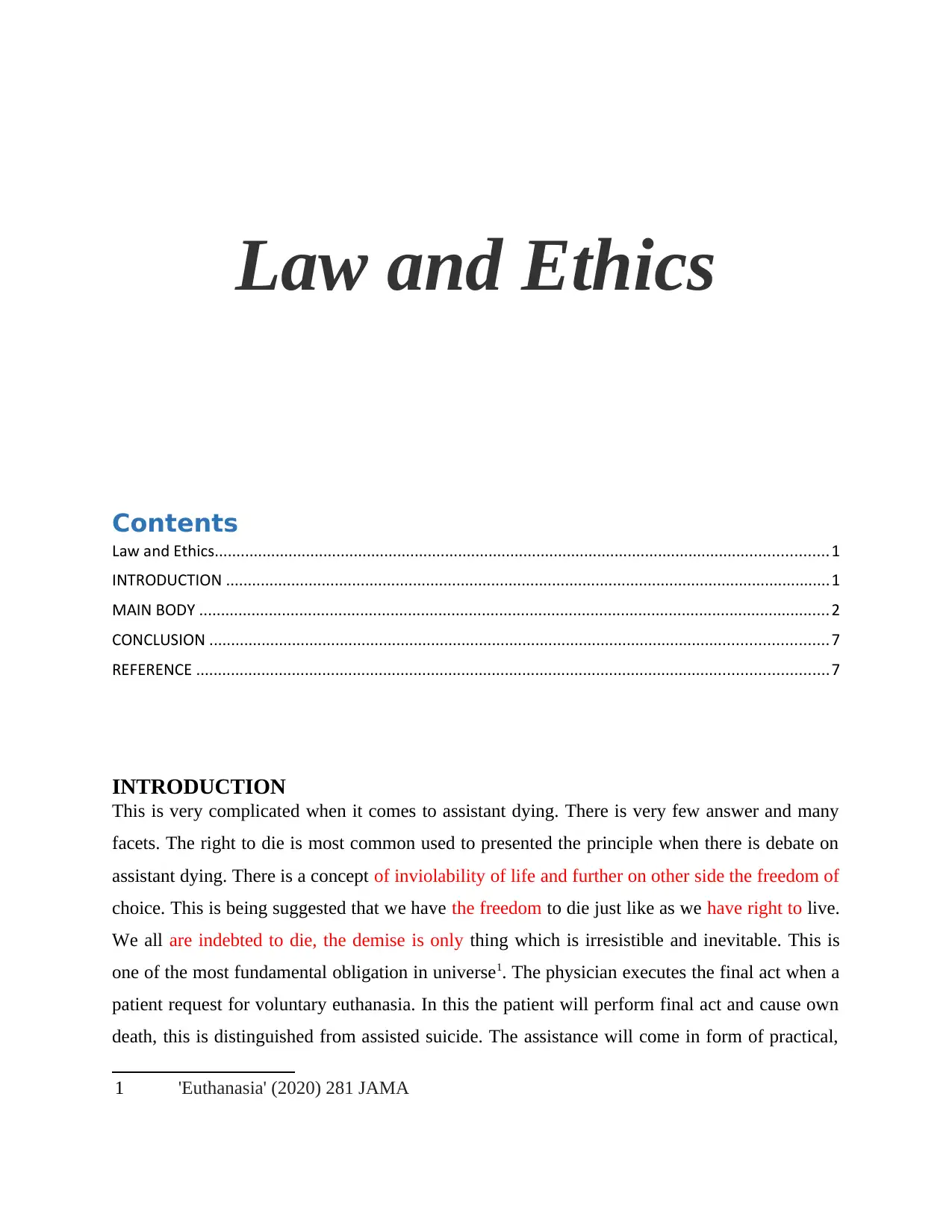
Law and Ethics
Contents
Law and Ethics.............................................................................................................................................1
INTRODUCTION ...........................................................................................................................................1
MAIN BODY .................................................................................................................................................2
CONCLUSION ..............................................................................................................................................7
REFERENCE .................................................................................................................................................7
INTRODUCTION
This is very complicated when it comes to assistant dying. There is very few answer and many
facets. The right to die is most common used to presented the principle when there is debate on
assistant dying. There is a concept of inviolability of life and further on other side the freedom of
choice. This is being suggested that we have the freedom to die just like as we have right to live.
We all are indebted to die, the demise is only thing which is irresistible and inevitable. This is
one of the most fundamental obligation in universe1. The physician executes the final act when a
patient request for voluntary euthanasia. In this the patient will perform final act and cause own
death, this is distinguished from assisted suicide. The assistance will come in form of practical,
1 'Euthanasia' (2020) 281 JAMA
Contents
Law and Ethics.............................................................................................................................................1
INTRODUCTION ...........................................................................................................................................1
MAIN BODY .................................................................................................................................................2
CONCLUSION ..............................................................................................................................................7
REFERENCE .................................................................................................................................................7
INTRODUCTION
This is very complicated when it comes to assistant dying. There is very few answer and many
facets. The right to die is most common used to presented the principle when there is debate on
assistant dying. There is a concept of inviolability of life and further on other side the freedom of
choice. This is being suggested that we have the freedom to die just like as we have right to live.
We all are indebted to die, the demise is only thing which is irresistible and inevitable. This is
one of the most fundamental obligation in universe1. The physician executes the final act when a
patient request for voluntary euthanasia. In this the patient will perform final act and cause own
death, this is distinguished from assisted suicide. The assistance will come in form of practical,
1 'Euthanasia' (2020) 281 JAMA
Paraphrase This Document
Need a fresh take? Get an instant paraphrase of this document with our AI Paraphraser
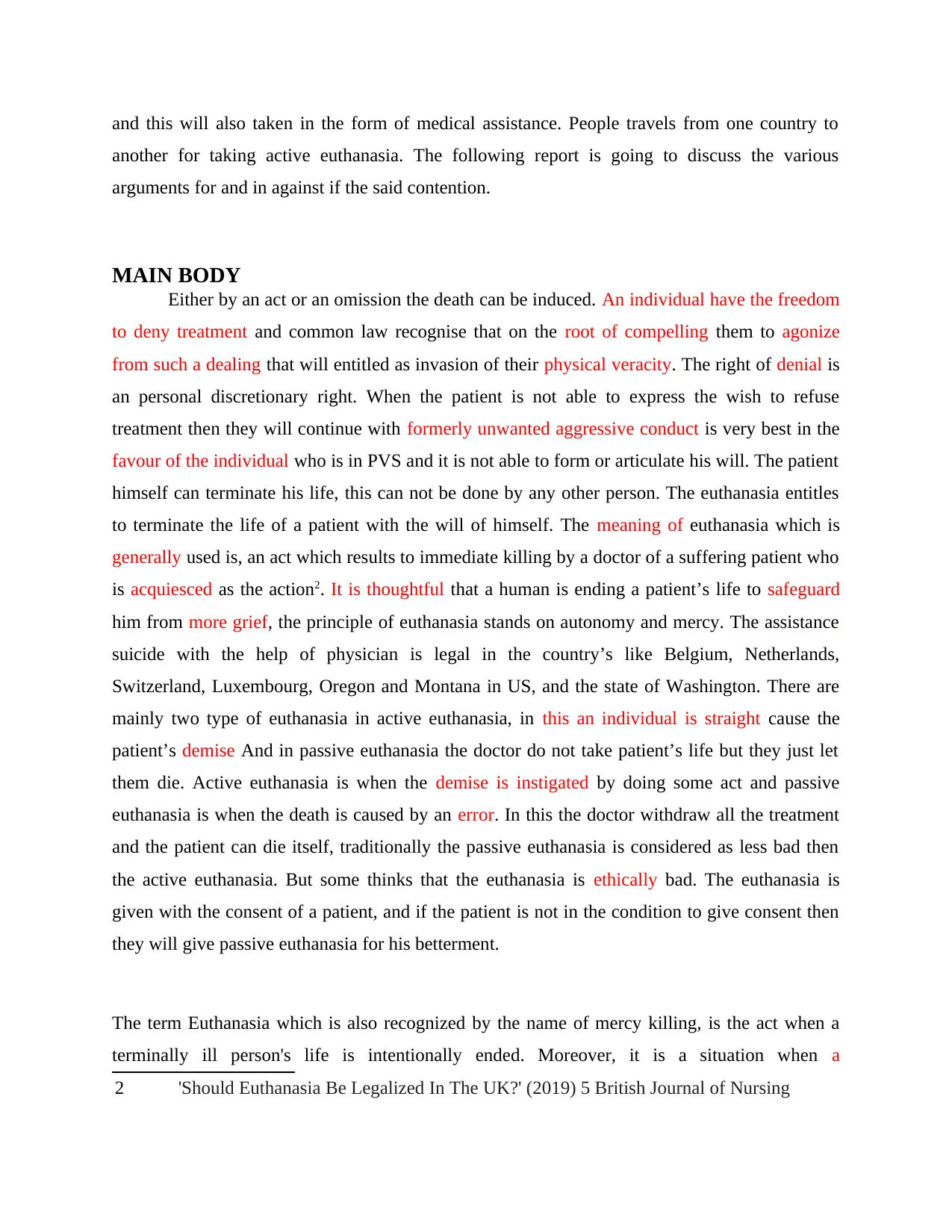
and this will also taken in the form of medical assistance. People travels from one country to
another for taking active euthanasia. The following report is going to discuss the various
arguments for and in against if the said contention.
MAIN BODY
Either by an act or an omission the death can be induced. An individual have the freedom
to deny treatment and common law recognise that on the root of compelling them to agonize
from such a dealing that will entitled as invasion of their physical veracity. The right of denial is
an personal discretionary right. When the patient is not able to express the wish to refuse
treatment then they will continue with formerly unwanted aggressive conduct is very best in the
favour of the individual who is in PVS and it is not able to form or articulate his will. The patient
himself can terminate his life, this can not be done by any other person. The euthanasia entitles
to terminate the life of a patient with the will of himself. The meaning of euthanasia which is
generally used is, an act which results to immediate killing by a doctor of a suffering patient who
is acquiesced as the action2. It is thoughtful that a human is ending a patient’s life to safeguard
him from more grief, the principle of euthanasia stands on autonomy and mercy. The assistance
suicide with the help of physician is legal in the country’s like Belgium, Netherlands,
Switzerland, Luxembourg, Oregon and Montana in US, and the state of Washington. There are
mainly two type of euthanasia in active euthanasia, in this an individual is straight cause the
patient’s demise And in passive euthanasia the doctor do not take patient’s life but they just let
them die. Active euthanasia is when the demise is instigated by doing some act and passive
euthanasia is when the death is caused by an error. In this the doctor withdraw all the treatment
and the patient can die itself, traditionally the passive euthanasia is considered as less bad then
the active euthanasia. But some thinks that the euthanasia is ethically bad. The euthanasia is
given with the consent of a patient, and if the patient is not in the condition to give consent then
they will give passive euthanasia for his betterment.
The term Euthanasia which is also recognized by the name of mercy killing, is the act when a
terminally ill person's life is intentionally ended. Moreover, it is a situation when a
2 'Should Euthanasia Be Legalized In The UK?' (2019) 5 British Journal of Nursing
another for taking active euthanasia. The following report is going to discuss the various
arguments for and in against if the said contention.
MAIN BODY
Either by an act or an omission the death can be induced. An individual have the freedom
to deny treatment and common law recognise that on the root of compelling them to agonize
from such a dealing that will entitled as invasion of their physical veracity. The right of denial is
an personal discretionary right. When the patient is not able to express the wish to refuse
treatment then they will continue with formerly unwanted aggressive conduct is very best in the
favour of the individual who is in PVS and it is not able to form or articulate his will. The patient
himself can terminate his life, this can not be done by any other person. The euthanasia entitles
to terminate the life of a patient with the will of himself. The meaning of euthanasia which is
generally used is, an act which results to immediate killing by a doctor of a suffering patient who
is acquiesced as the action2. It is thoughtful that a human is ending a patient’s life to safeguard
him from more grief, the principle of euthanasia stands on autonomy and mercy. The assistance
suicide with the help of physician is legal in the country’s like Belgium, Netherlands,
Switzerland, Luxembourg, Oregon and Montana in US, and the state of Washington. There are
mainly two type of euthanasia in active euthanasia, in this an individual is straight cause the
patient’s demise And in passive euthanasia the doctor do not take patient’s life but they just let
them die. Active euthanasia is when the demise is instigated by doing some act and passive
euthanasia is when the death is caused by an error. In this the doctor withdraw all the treatment
and the patient can die itself, traditionally the passive euthanasia is considered as less bad then
the active euthanasia. But some thinks that the euthanasia is ethically bad. The euthanasia is
given with the consent of a patient, and if the patient is not in the condition to give consent then
they will give passive euthanasia for his betterment.
The term Euthanasia which is also recognized by the name of mercy killing, is the act when a
terminally ill person's life is intentionally ended. Moreover, it is a situation when a
2 'Should Euthanasia Be Legalized In The UK?' (2019) 5 British Journal of Nursing
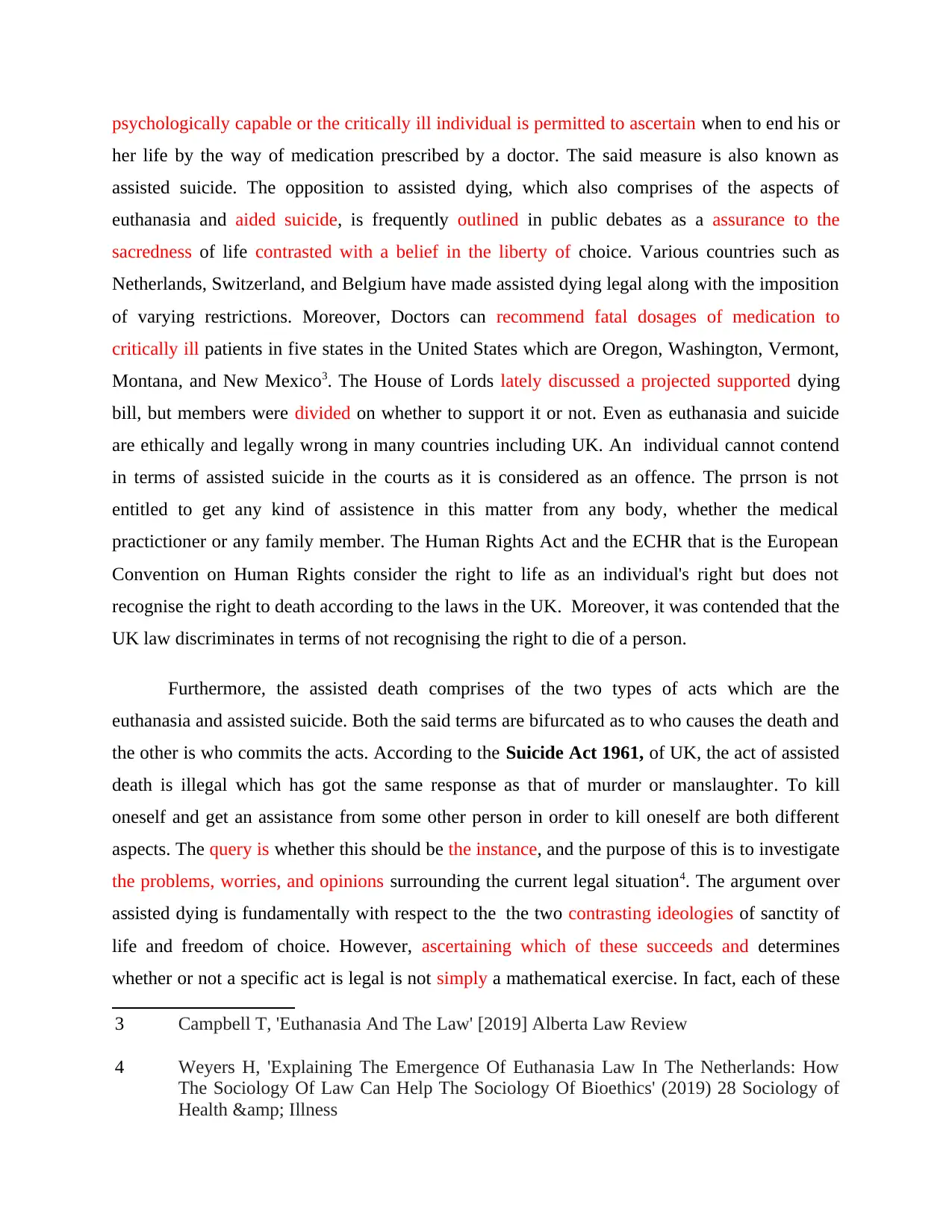
psychologically capable or the critically ill individual is permitted to ascertain when to end his or
her life by the way of medication prescribed by a doctor. The said measure is also known as
assisted suicide. The opposition to assisted dying, which also comprises of the aspects of
euthanasia and aided suicide, is frequently outlined in public debates as a assurance to the
sacredness of life contrasted with a belief in the liberty of choice. Various countries such as
Netherlands, Switzerland, and Belgium have made assisted dying legal along with the imposition
of varying restrictions. Moreover, Doctors can recommend fatal dosages of medication to
critically ill patients in five states in the United States which are Oregon, Washington, Vermont,
Montana, and New Mexico3. The House of Lords lately discussed a projected supported dying
bill, but members were divided on whether to support it or not. Even as euthanasia and suicide
are ethically and legally wrong in many countries including UK. An individual cannot contend
in terms of assisted suicide in the courts as it is considered as an offence. The prrson is not
entitled to get any kind of assistence in this matter from any body, whether the medical
practictioner or any family member. The Human Rights Act and the ECHR that is the European
Convention on Human Rights consider the right to life as an individual's right but does not
recognise the right to death according to the laws in the UK. Moreover, it was contended that the
UK law discriminates in terms of not recognising the right to die of a person.
Furthermore, the assisted death comprises of the two types of acts which are the
euthanasia and assisted suicide. Both the said terms are bifurcated as to who causes the death and
the other is who commits the acts. According to the Suicide Act 1961, of UK, the act of assisted
death is illegal which has got the same response as that of murder or manslaughter. To kill
oneself and get an assistance from some other person in order to kill oneself are both different
aspects. The query is whether this should be the instance, and the purpose of this is to investigate
the problems, worries, and opinions surrounding the current legal situation4. The argument over
assisted dying is fundamentally with respect to the the two contrasting ideologies of sanctity of
life and freedom of choice. However, ascertaining which of these succeeds and determines
whether or not a specific act is legal is not simply a mathematical exercise. In fact, each of these
3 Campbell T, 'Euthanasia And The Law' [2019] Alberta Law Review
4 Weyers H, 'Explaining The Emergence Of Euthanasia Law In The Netherlands: How
The Sociology Of Law Can Help The Sociology Of Bioethics' (2019) 28 Sociology of
Health & Illness
her life by the way of medication prescribed by a doctor. The said measure is also known as
assisted suicide. The opposition to assisted dying, which also comprises of the aspects of
euthanasia and aided suicide, is frequently outlined in public debates as a assurance to the
sacredness of life contrasted with a belief in the liberty of choice. Various countries such as
Netherlands, Switzerland, and Belgium have made assisted dying legal along with the imposition
of varying restrictions. Moreover, Doctors can recommend fatal dosages of medication to
critically ill patients in five states in the United States which are Oregon, Washington, Vermont,
Montana, and New Mexico3. The House of Lords lately discussed a projected supported dying
bill, but members were divided on whether to support it or not. Even as euthanasia and suicide
are ethically and legally wrong in many countries including UK. An individual cannot contend
in terms of assisted suicide in the courts as it is considered as an offence. The prrson is not
entitled to get any kind of assistence in this matter from any body, whether the medical
practictioner or any family member. The Human Rights Act and the ECHR that is the European
Convention on Human Rights consider the right to life as an individual's right but does not
recognise the right to death according to the laws in the UK. Moreover, it was contended that the
UK law discriminates in terms of not recognising the right to die of a person.
Furthermore, the assisted death comprises of the two types of acts which are the
euthanasia and assisted suicide. Both the said terms are bifurcated as to who causes the death and
the other is who commits the acts. According to the Suicide Act 1961, of UK, the act of assisted
death is illegal which has got the same response as that of murder or manslaughter. To kill
oneself and get an assistance from some other person in order to kill oneself are both different
aspects. The query is whether this should be the instance, and the purpose of this is to investigate
the problems, worries, and opinions surrounding the current legal situation4. The argument over
assisted dying is fundamentally with respect to the the two contrasting ideologies of sanctity of
life and freedom of choice. However, ascertaining which of these succeeds and determines
whether or not a specific act is legal is not simply a mathematical exercise. In fact, each of these
3 Campbell T, 'Euthanasia And The Law' [2019] Alberta Law Review
4 Weyers H, 'Explaining The Emergence Of Euthanasia Law In The Netherlands: How
The Sociology Of Law Can Help The Sociology Of Bioethics' (2019) 28 Sociology of
Health & Illness
⊘ This is a preview!⊘
Do you want full access?
Subscribe today to unlock all pages.

Trusted by 1+ million students worldwide
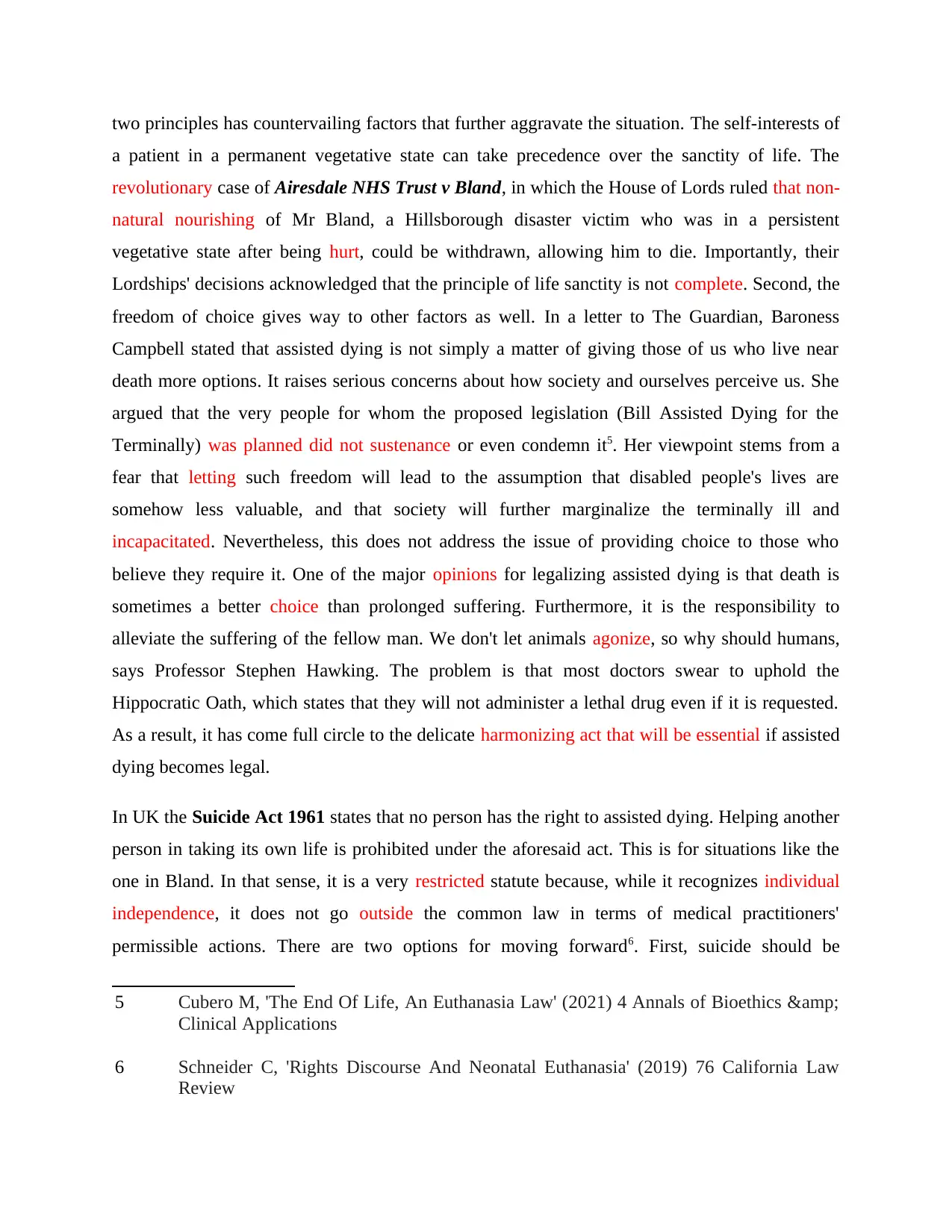
two principles has countervailing factors that further aggravate the situation. The self-interests of
a patient in a permanent vegetative state can take precedence over the sanctity of life. The
revolutionary case of Airesdale NHS Trust v Bland, in which the House of Lords ruled that non-
natural nourishing of Mr Bland, a Hillsborough disaster victim who was in a persistent
vegetative state after being hurt, could be withdrawn, allowing him to die. Importantly, their
Lordships' decisions acknowledged that the principle of life sanctity is not complete. Second, the
freedom of choice gives way to other factors as well. In a letter to The Guardian, Baroness
Campbell stated that assisted dying is not simply a matter of giving those of us who live near
death more options. It raises serious concerns about how society and ourselves perceive us. She
argued that the very people for whom the proposed legislation (Bill Assisted Dying for the
Terminally) was planned did not sustenance or even condemn it5. Her viewpoint stems from a
fear that letting such freedom will lead to the assumption that disabled people's lives are
somehow less valuable, and that society will further marginalize the terminally ill and
incapacitated. Nevertheless, this does not address the issue of providing choice to those who
believe they require it. One of the major opinions for legalizing assisted dying is that death is
sometimes a better choice than prolonged suffering. Furthermore, it is the responsibility to
alleviate the suffering of the fellow man. We don't let animals agonize, so why should humans,
says Professor Stephen Hawking. The problem is that most doctors swear to uphold the
Hippocratic Oath, which states that they will not administer a lethal drug even if it is requested.
As a result, it has come full circle to the delicate harmonizing act that will be essential if assisted
dying becomes legal.
In UK the Suicide Act 1961 states that no person has the right to assisted dying. Helping another
person in taking its own life is prohibited under the aforesaid act. This is for situations like the
one in Bland. In that sense, it is a very restricted statute because, while it recognizes individual
independence, it does not go outside the common law in terms of medical practitioners'
permissible actions. There are two options for moving forward6. First, suicide should be
5 Cubero M, 'The End Of Life, An Euthanasia Law' (2021) 4 Annals of Bioethics &
Clinical Applications
6 Schneider C, 'Rights Discourse And Neonatal Euthanasia' (2019) 76 California Law
Review
a patient in a permanent vegetative state can take precedence over the sanctity of life. The
revolutionary case of Airesdale NHS Trust v Bland, in which the House of Lords ruled that non-
natural nourishing of Mr Bland, a Hillsborough disaster victim who was in a persistent
vegetative state after being hurt, could be withdrawn, allowing him to die. Importantly, their
Lordships' decisions acknowledged that the principle of life sanctity is not complete. Second, the
freedom of choice gives way to other factors as well. In a letter to The Guardian, Baroness
Campbell stated that assisted dying is not simply a matter of giving those of us who live near
death more options. It raises serious concerns about how society and ourselves perceive us. She
argued that the very people for whom the proposed legislation (Bill Assisted Dying for the
Terminally) was planned did not sustenance or even condemn it5. Her viewpoint stems from a
fear that letting such freedom will lead to the assumption that disabled people's lives are
somehow less valuable, and that society will further marginalize the terminally ill and
incapacitated. Nevertheless, this does not address the issue of providing choice to those who
believe they require it. One of the major opinions for legalizing assisted dying is that death is
sometimes a better choice than prolonged suffering. Furthermore, it is the responsibility to
alleviate the suffering of the fellow man. We don't let animals agonize, so why should humans,
says Professor Stephen Hawking. The problem is that most doctors swear to uphold the
Hippocratic Oath, which states that they will not administer a lethal drug even if it is requested.
As a result, it has come full circle to the delicate harmonizing act that will be essential if assisted
dying becomes legal.
In UK the Suicide Act 1961 states that no person has the right to assisted dying. Helping another
person in taking its own life is prohibited under the aforesaid act. This is for situations like the
one in Bland. In that sense, it is a very restricted statute because, while it recognizes individual
independence, it does not go outside the common law in terms of medical practitioners'
permissible actions. There are two options for moving forward6. First, suicide should be
5 Cubero M, 'The End Of Life, An Euthanasia Law' (2021) 4 Annals of Bioethics &
Clinical Applications
6 Schneider C, 'Rights Discourse And Neonatal Euthanasia' (2019) 76 California Law
Review
Paraphrase This Document
Need a fresh take? Get an instant paraphrase of this document with our AI Paraphraser
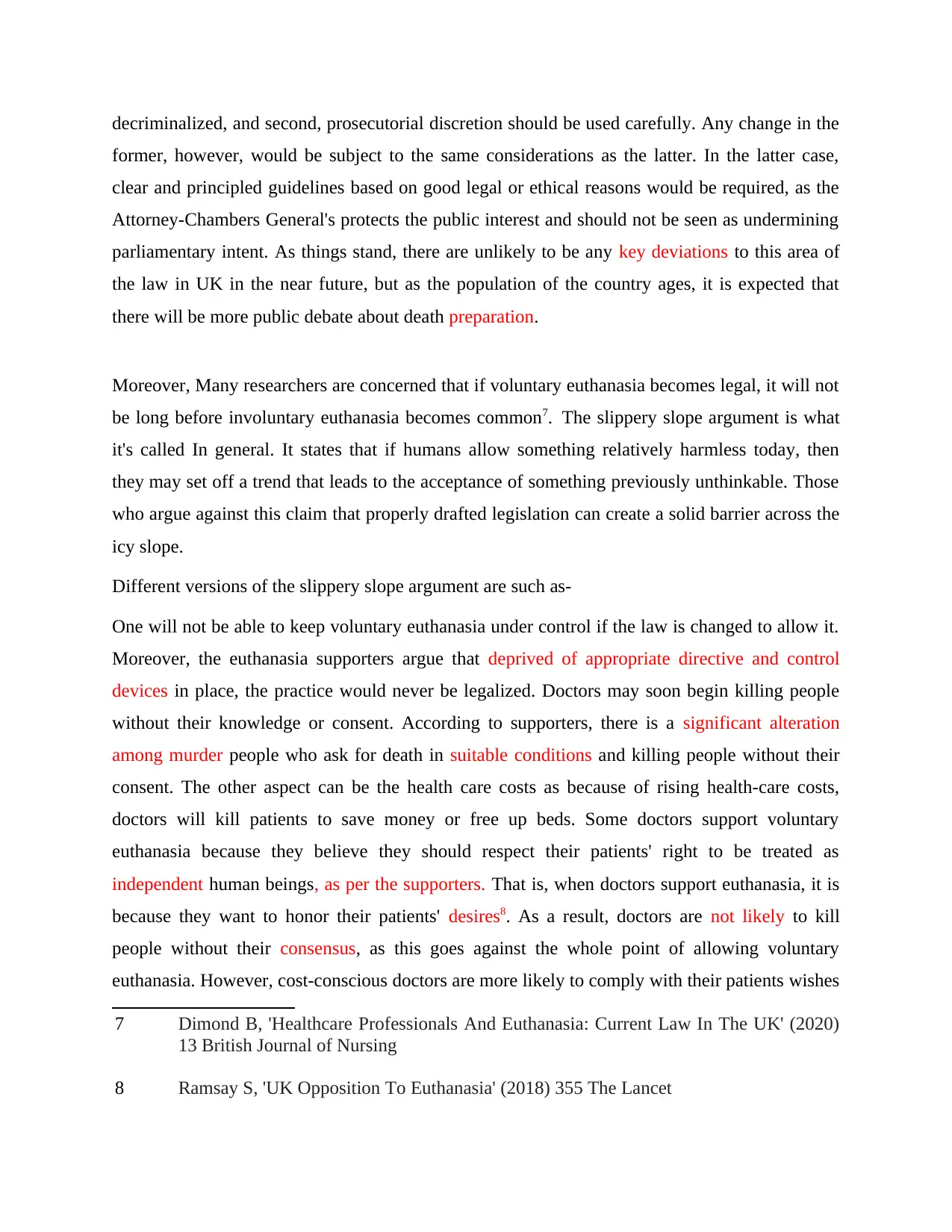
decriminalized, and second, prosecutorial discretion should be used carefully. Any change in the
former, however, would be subject to the same considerations as the latter. In the latter case,
clear and principled guidelines based on good legal or ethical reasons would be required, as the
Attorney-Chambers General's protects the public interest and should not be seen as undermining
parliamentary intent. As things stand, there are unlikely to be any key deviations to this area of
the law in UK in the near future, but as the population of the country ages, it is expected that
there will be more public debate about death preparation.
Moreover, Many researchers are concerned that if voluntary euthanasia becomes legal, it will not
be long before involuntary euthanasia becomes common7. The slippery slope argument is what
it's called In general. It states that if humans allow something relatively harmless today, then
they may set off a trend that leads to the acceptance of something previously unthinkable. Those
who argue against this claim that properly drafted legislation can create a solid barrier across the
icy slope.
Different versions of the slippery slope argument are such as-
One will not be able to keep voluntary euthanasia under control if the law is changed to allow it.
Moreover, the euthanasia supporters argue that deprived of appropriate directive and control
devices in place, the practice would never be legalized. Doctors may soon begin killing people
without their knowledge or consent. According to supporters, there is a significant alteration
among murder people who ask for death in suitable conditions and killing people without their
consent. The other aspect can be the health care costs as because of rising health-care costs,
doctors will kill patients to save money or free up beds. Some doctors support voluntary
euthanasia because they believe they should respect their patients' right to be treated as
independent human beings, as per the supporters. That is, when doctors support euthanasia, it is
because they want to honor their patients' desires8. As a result, doctors are not likely to kill
people without their consensus, as this goes against the whole point of allowing voluntary
euthanasia. However, cost-conscious doctors are more likely to comply with their patients wishes
7 Dimond B, 'Healthcare Professionals And Euthanasia: Current Law In The UK' (2020)
13 British Journal of Nursing
8 Ramsay S, 'UK Opposition To Euthanasia' (2018) 355 The Lancet
former, however, would be subject to the same considerations as the latter. In the latter case,
clear and principled guidelines based on good legal or ethical reasons would be required, as the
Attorney-Chambers General's protects the public interest and should not be seen as undermining
parliamentary intent. As things stand, there are unlikely to be any key deviations to this area of
the law in UK in the near future, but as the population of the country ages, it is expected that
there will be more public debate about death preparation.
Moreover, Many researchers are concerned that if voluntary euthanasia becomes legal, it will not
be long before involuntary euthanasia becomes common7. The slippery slope argument is what
it's called In general. It states that if humans allow something relatively harmless today, then
they may set off a trend that leads to the acceptance of something previously unthinkable. Those
who argue against this claim that properly drafted legislation can create a solid barrier across the
icy slope.
Different versions of the slippery slope argument are such as-
One will not be able to keep voluntary euthanasia under control if the law is changed to allow it.
Moreover, the euthanasia supporters argue that deprived of appropriate directive and control
devices in place, the practice would never be legalized. Doctors may soon begin killing people
without their knowledge or consent. According to supporters, there is a significant alteration
among murder people who ask for death in suitable conditions and killing people without their
consent. The other aspect can be the health care costs as because of rising health-care costs,
doctors will kill patients to save money or free up beds. Some doctors support voluntary
euthanasia because they believe they should respect their patients' right to be treated as
independent human beings, as per the supporters. That is, when doctors support euthanasia, it is
because they want to honor their patients' desires8. As a result, doctors are not likely to kill
people without their consensus, as this goes against the whole point of allowing voluntary
euthanasia. However, cost-conscious doctors are more likely to comply with their patients wishes
7 Dimond B, 'Healthcare Professionals And Euthanasia: Current Law In The UK' (2020)
13 British Journal of Nursing
8 Ramsay S, 'UK Opposition To Euthanasia' (2018) 355 The Lancet
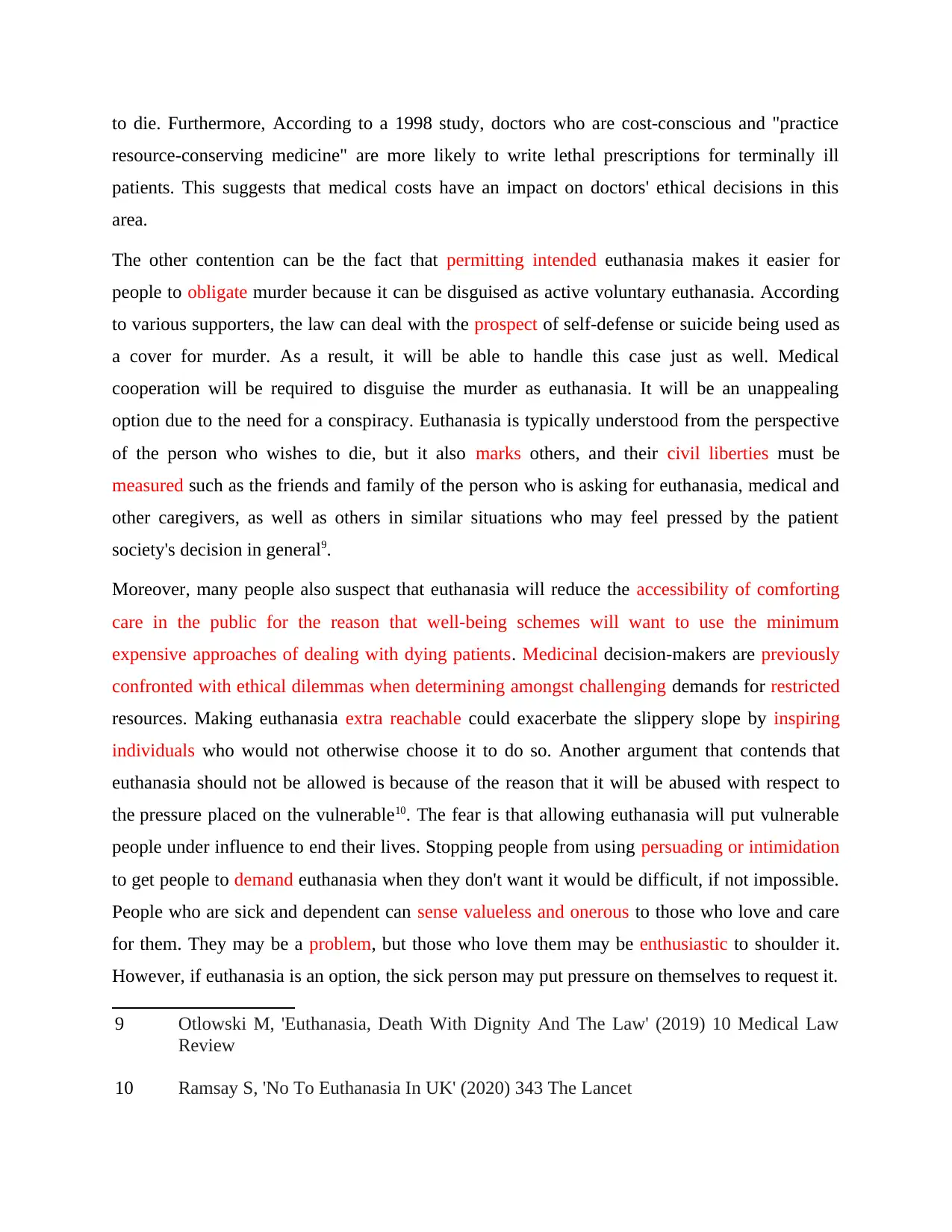
to die. Furthermore, According to a 1998 study, doctors who are cost-conscious and "practice
resource-conserving medicine" are more likely to write lethal prescriptions for terminally ill
patients. This suggests that medical costs have an impact on doctors' ethical decisions in this
area.
The other contention can be the fact that permitting intended euthanasia makes it easier for
people to obligate murder because it can be disguised as active voluntary euthanasia. According
to various supporters, the law can deal with the prospect of self-defense or suicide being used as
a cover for murder. As a result, it will be able to handle this case just as well. Medical
cooperation will be required to disguise the murder as euthanasia. It will be an unappealing
option due to the need for a conspiracy. Euthanasia is typically understood from the perspective
of the person who wishes to die, but it also marks others, and their civil liberties must be
measured such as the friends and family of the person who is asking for euthanasia, medical and
other caregivers, as well as others in similar situations who may feel pressed by the patient
society's decision in general9.
Moreover, many people also suspect that euthanasia will reduce the accessibility of comforting
care in the public for the reason that well-being schemes will want to use the minimum
expensive approaches of dealing with dying patients. Medicinal decision-makers are previously
confronted with ethical dilemmas when determining amongst challenging demands for restricted
resources. Making euthanasia extra reachable could exacerbate the slippery slope by inspiring
individuals who would not otherwise choose it to do so. Another argument that contends that
euthanasia should not be allowed is because of the reason that it will be abused with respect to
the pressure placed on the vulnerable10. The fear is that allowing euthanasia will put vulnerable
people under influence to end their lives. Stopping people from using persuading or intimidation
to get people to demand euthanasia when they don't want it would be difficult, if not impossible.
People who are sick and dependent can sense valueless and onerous to those who love and care
for them. They may be a problem, but those who love them may be enthusiastic to shoulder it.
However, if euthanasia is an option, the sick person may put pressure on themselves to request it.
9 Otlowski M, 'Euthanasia, Death With Dignity And The Law' (2019) 10 Medical Law
Review
10 Ramsay S, 'No To Euthanasia In UK' (2020) 343 The Lancet
resource-conserving medicine" are more likely to write lethal prescriptions for terminally ill
patients. This suggests that medical costs have an impact on doctors' ethical decisions in this
area.
The other contention can be the fact that permitting intended euthanasia makes it easier for
people to obligate murder because it can be disguised as active voluntary euthanasia. According
to various supporters, the law can deal with the prospect of self-defense or suicide being used as
a cover for murder. As a result, it will be able to handle this case just as well. Medical
cooperation will be required to disguise the murder as euthanasia. It will be an unappealing
option due to the need for a conspiracy. Euthanasia is typically understood from the perspective
of the person who wishes to die, but it also marks others, and their civil liberties must be
measured such as the friends and family of the person who is asking for euthanasia, medical and
other caregivers, as well as others in similar situations who may feel pressed by the patient
society's decision in general9.
Moreover, many people also suspect that euthanasia will reduce the accessibility of comforting
care in the public for the reason that well-being schemes will want to use the minimum
expensive approaches of dealing with dying patients. Medicinal decision-makers are previously
confronted with ethical dilemmas when determining amongst challenging demands for restricted
resources. Making euthanasia extra reachable could exacerbate the slippery slope by inspiring
individuals who would not otherwise choose it to do so. Another argument that contends that
euthanasia should not be allowed is because of the reason that it will be abused with respect to
the pressure placed on the vulnerable10. The fear is that allowing euthanasia will put vulnerable
people under influence to end their lives. Stopping people from using persuading or intimidation
to get people to demand euthanasia when they don't want it would be difficult, if not impossible.
People who are sick and dependent can sense valueless and onerous to those who love and care
for them. They may be a problem, but those who love them may be enthusiastic to shoulder it.
However, if euthanasia is an option, the sick person may put pressure on themselves to request it.
9 Otlowski M, 'Euthanasia, Death With Dignity And The Law' (2019) 10 Medical Law
Review
10 Ramsay S, 'No To Euthanasia In UK' (2020) 343 The Lancet
⊘ This is a preview!⊘
Do you want full access?
Subscribe today to unlock all pages.

Trusted by 1+ million students worldwide
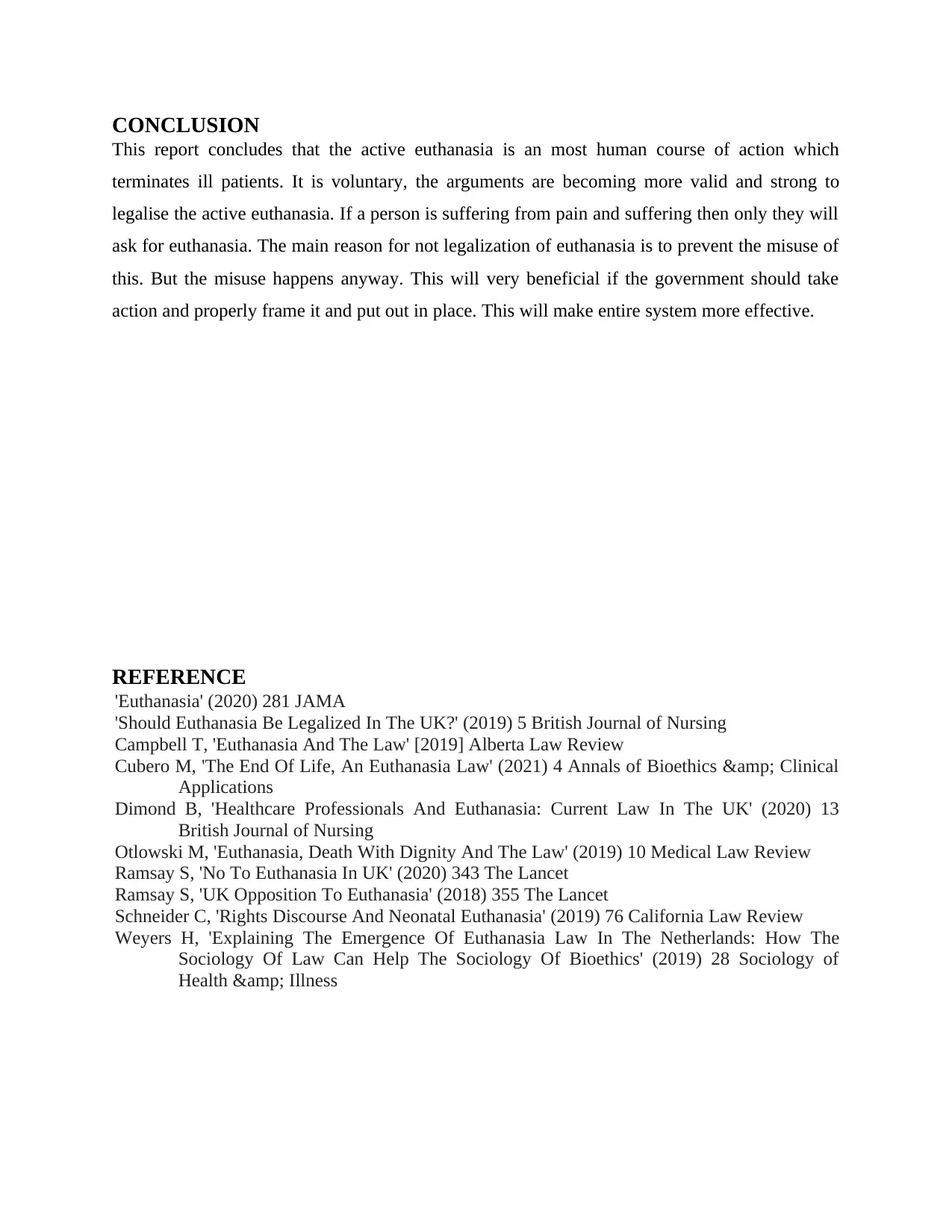
CONCLUSION
This report concludes that the active euthanasia is an most human course of action which
terminates ill patients. It is voluntary, the arguments are becoming more valid and strong to
legalise the active euthanasia. If a person is suffering from pain and suffering then only they will
ask for euthanasia. The main reason for not legalization of euthanasia is to prevent the misuse of
this. But the misuse happens anyway. This will very beneficial if the government should take
action and properly frame it and put out in place. This will make entire system more effective.
REFERENCE
'Euthanasia' (2020) 281 JAMA
'Should Euthanasia Be Legalized In The UK?' (2019) 5 British Journal of Nursing
Campbell T, 'Euthanasia And The Law' [2019] Alberta Law Review
Cubero M, 'The End Of Life, An Euthanasia Law' (2021) 4 Annals of Bioethics & Clinical
Applications
Dimond B, 'Healthcare Professionals And Euthanasia: Current Law In The UK' (2020) 13
British Journal of Nursing
Otlowski M, 'Euthanasia, Death With Dignity And The Law' (2019) 10 Medical Law Review
Ramsay S, 'No To Euthanasia In UK' (2020) 343 The Lancet
Ramsay S, 'UK Opposition To Euthanasia' (2018) 355 The Lancet
Schneider C, 'Rights Discourse And Neonatal Euthanasia' (2019) 76 California Law Review
Weyers H, 'Explaining The Emergence Of Euthanasia Law In The Netherlands: How The
Sociology Of Law Can Help The Sociology Of Bioethics' (2019) 28 Sociology of
Health & Illness
This report concludes that the active euthanasia is an most human course of action which
terminates ill patients. It is voluntary, the arguments are becoming more valid and strong to
legalise the active euthanasia. If a person is suffering from pain and suffering then only they will
ask for euthanasia. The main reason for not legalization of euthanasia is to prevent the misuse of
this. But the misuse happens anyway. This will very beneficial if the government should take
action and properly frame it and put out in place. This will make entire system more effective.
REFERENCE
'Euthanasia' (2020) 281 JAMA
'Should Euthanasia Be Legalized In The UK?' (2019) 5 British Journal of Nursing
Campbell T, 'Euthanasia And The Law' [2019] Alberta Law Review
Cubero M, 'The End Of Life, An Euthanasia Law' (2021) 4 Annals of Bioethics & Clinical
Applications
Dimond B, 'Healthcare Professionals And Euthanasia: Current Law In The UK' (2020) 13
British Journal of Nursing
Otlowski M, 'Euthanasia, Death With Dignity And The Law' (2019) 10 Medical Law Review
Ramsay S, 'No To Euthanasia In UK' (2020) 343 The Lancet
Ramsay S, 'UK Opposition To Euthanasia' (2018) 355 The Lancet
Schneider C, 'Rights Discourse And Neonatal Euthanasia' (2019) 76 California Law Review
Weyers H, 'Explaining The Emergence Of Euthanasia Law In The Netherlands: How The
Sociology Of Law Can Help The Sociology Of Bioethics' (2019) 28 Sociology of
Health & Illness
1 out of 7
Related Documents
Your All-in-One AI-Powered Toolkit for Academic Success.
+13062052269
info@desklib.com
Available 24*7 on WhatsApp / Email
![[object Object]](/_next/static/media/star-bottom.7253800d.svg)
Unlock your academic potential
Copyright © 2020–2026 A2Z Services. All Rights Reserved. Developed and managed by ZUCOL.





